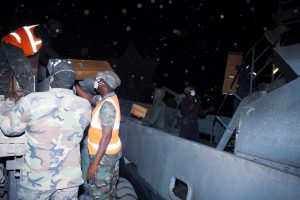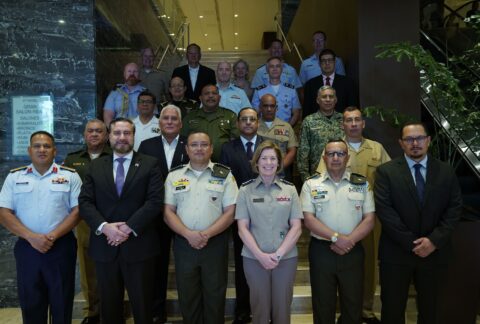One week after the La Soufrière volcano erupted on the island of St. Vincent, member nations of the Caribbean Community (CARICOM) and other countries of the region continue to offer their support to the Vincentian government by opening their borders to receive evacuees and providing emergency supplies and equipment.
The volcano, which first erupted on April 9, has experienced several explosive eruptions since then, decimating crops and vegetation and compromising water sources on the island. The volcano’s eruptions have left the island’s entire population — some 100,000 inhabitants — without electricity and water, the United Nations reported in a statement on April 12.

During a special emergency session among CARICOM member countries on April 15, Prime Minister of St. Vincent and the Grenadines Ralph Gonsalves said that the authorities had evacuated more than 10,000 people from the immediate disaster area, which covers approximately one-third of the island.
That same day, the Grenada government said in a statement that it would provide $370,000 to support the neighboring island — days earlier, the St. Kitts and Nevis government promised the same amount.
On April 15, Pan American Health Organization (PAHO) personnel and units of the Barbados Defence Force (BDF) delivered 100,000 masks, personal protective equipment, and cleaning supplies, the PAHO said on Twitter. The BDF has deployed two contingents with about 100 service members to support the Vincentian government.
That same day, the Office of the Prime Minister of Antigua and Barbuda announced on Twitter that it would accommodate about 250 Vincentian evacuees in a hotel in the extreme southwest of the island of Antigua. The aid is in addition to the container full of supplies — including water, water tanks, power generators, mosquito nets, cots, blankets, towels, sheets, and flashlights — that was sent to St. Vincent a few days earlier.
On April 14, in the port of Kingstown, a French Navy frigate delivered emergency supplies, including 75 tons of drinking water, the Antillean radio station RCI reported. That same day, the U.S. Embassy in Barbados and the Eastern Caribbean said that the U.S. Agency for International Development will send an additional $100,000 in aid to people affected by the volcano, while U.S. Southern Command will fund humanitarian assistance projects worth $60,000.
For its part, the Trinidad and Tobago Defence Force arrived in St. Vincent on April 13, with a contingent of 50 soldiers — who remained on the island — and emergency supplies, including water bottles, canned food, and hygiene kits.
“It is truly commendable that in times of crisis, we can depend on the solidarity and support of our region,” said Didacus Jules, director general of the Organization of Eastern Caribbean States (OECS). “This, more than anything else, proves that we are stronger together.”
It is truly commendable that in times of crisis, we can depend on the solidarity and support of our region… This, more than anything else, proves that we are stronger together,” Didacus Jules, director general of the Organization of Eastern Caribbean States.









